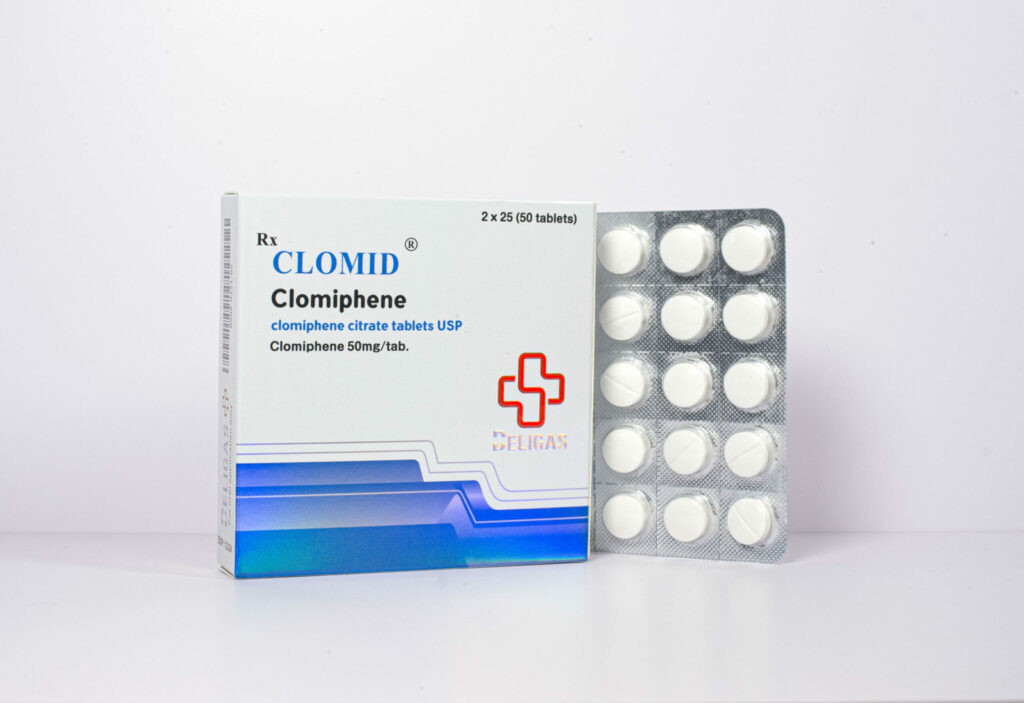Discover how clomiphene citrate can positively impact male fertility.
Clomiphene Citrate, commonly referred to as Clomid, is a medication that has gained significant popularity in the field of male fertility treatment. While traditionally used to induce ovulation in women, research has shown that it can also have positive effects on male fertility. This article will explore the benefits of Clomiphene Citrate for male fertility, helping individuals gain a comprehensive understanding of its potential advantages and limitations.
Understanding Clomiphene Citrate
What is Clomiphene Citrate?
Clomiphene Citrate is a selective estrogen receptor modulator (SERM) that works by stimulating the release of hormones necessary for the production and maturation of sperm. It is available in tablet form and is typically prescribed as an off-label treatment for male infertility issues.

Clomiphene Citrate is commonly known by its brand names, such as Clomid or Serophene. It is a widely used medication in the field of reproductive medicine and is often the first-line treatment for men with low sperm count or poor sperm motility. While originally developed to treat female infertility by inducing ovulation, its off-label use in men has shown promising results in improving sperm parameters.
How Does Clomiphene Citrate Work?
Clomiphene Citrate works by blocking the negative feedback of estrogen on the hypothalamus, thereby increasing the release of hormones that stimulate the production of testosterone in the testes. By boosting testosterone levels, Clomiphene Citrate helps improve the maturation and function of sperm cells, ultimately enhancing male fertility.
It is important to note that the use of Clomiphene Citrate in men should be carefully monitored by a healthcare provider, as improper dosages or prolonged use can lead to potential side effects such as mood swings, hot flashes, and visual disturbances. Regular monitoring of hormone levels and sperm parameters is essential to ensure the safe and effective use of this medication for male infertility treatment.
The Role of Clomiphene Citrate in Male Fertility
Clomiphene Citrate is a medication that plays a crucial role in enhancing male fertility. One of its key benefits is its ability to boost testosterone levels in men. Testosterone is a hormone essential for the development and maintenance of male reproductive organs, as well as for the production of healthy sperm. By increasing testosterone levels, Clomiphene Citrate helps in improving sperm count, motility, and morphology, all of which are vital factors for male fertility.
Enhancing Testosterone Levels
Testosterone is not only important for physical characteristics like muscle mass and bone density but also for reproductive health. Low testosterone levels can lead to issues such as decreased libido, erectile dysfunction, and infertility. Clomiphene Citrate works by stimulating the release of hormones from the pituitary gland, which in turn signals the testes to produce more testosterone. This increase in testosterone levels can have a positive impact on sperm production and overall male fertility.
Improving Sperm Count and Quality
Aside from its role in enhancing testosterone levels, Clomiphene Citrate has also been shown to improve sperm count and quality in men. Research studies have demonstrated that men undergoing Clomiphene Citrate treatment experienced a notable increase in the number of sperm cells and an enhancement in the overall quality of their sperm. These improvements are crucial for couples trying to conceive, as higher sperm count and better sperm quality can significantly increase the likelihood of successful fertilization.
The Safety and Side Effects of Clomiphene Citrate
Common Side Effects
Like any medication, Clomiphene Citrate may cause some side effects. These side effects are generally mild and include hot flashes, mood swings, nausea, and headache. Most individuals tolerate the medication well, with side effects subsiding over time.
Hot flashes are a common side effect of Clomiphene Citrate, characterized by sudden feelings of warmth, flushing, and sweating. These episodes can be uncomfortable but are usually temporary. Mood swings may also occur, ranging from irritability to emotional sensitivity. It is important to communicate any changes in mood to your healthcare provider to ensure proper support and monitoring.
Long-term Safety Concerns
While Clomiphene Citrate has shown promising results in male fertility treatment, there are limited long-term studies on its safety. It is important for individuals considering Clomiphene Citrate to discuss any concerns with their healthcare provider and weigh the potential benefits against the possible risks.
Nausea is another common side effect of Clomiphene Citrate, which may be alleviated by taking the medication with food or before bedtime. Headaches can also occur, but they are typically mild and can be managed with over-the-counter pain relievers. It is essential to follow your healthcare provider’s recommendations regarding dosage and timing to minimize the risk of side effects.
The Efficacy of Clomiphene Citrate for Male Fertility
Success Rates of Clomiphene Citrate Treatment
The success rates of Clomiphene Citrate treatment vary depending on individual factors, such as the underlying cause of infertility, age, and overall health. Research suggests that Clomiphene Citrate can improve sperm parameters in approximately 70% of men with certain types of infertility. However, it is important to note that individual results may vary.
Clomiphene Citrate, a selective estrogen receptor modulator, works by stimulating the production of hormones that are essential for sperm production. This medication is commonly prescribed off-label for male infertility, especially in cases where low sperm count or poor sperm motility is a concern. By targeting hormonal imbalances that may be affecting fertility, Clomiphene Citrate can help improve sperm quality and increase the chances of conception.
Factors Influencing Treatment Efficacy
Several factors can influence the efficacy of Clomiphene Citrate treatment for male fertility. These include the duration of treatment, adherence to the prescribed dosage, and lifestyle factors such as smoking, excessive alcohol consumption, and obesity. It is essential to discuss these factors with a healthcare professional to optimize treatment outcomes.
Furthermore, underlying medical conditions such as hypogonadism or pituitary disorders can impact the effectiveness of Clomiphene Citrate therapy. In cases where infertility is caused by anatomical issues or genetic factors, the response to treatment may vary. Close monitoring by a fertility specialist is crucial to assess the progress of treatment and make any necessary adjustments to maximize the chances of success.
Alternatives to Clomiphene Citrate for Male Fertility
Other Medications
While Clomiphene Citrate is a widely used medication for male fertility, there are other alternatives available. These include medications such as Human Chorionic Gonadotropin (hCG), aromatase inhibitors, and gonadotropin-releasing hormone (GnRH) agonists. Each alternative has its own unique mechanism of action and potential benefits, and healthcare providers can help determine the most suitable option for individual cases.
Human Chorionic Gonadotropin (hCG) is a hormone that can stimulate the production of testosterone in the testicles, which can help improve sperm production. It is typically administered through injections and may be used in combination with other medications or treatments.
Aromatase inhibitors, on the other hand, work by blocking the conversion of testosterone into estrogen, which can help maintain hormonal balance and improve fertility. These medications are often prescribed to men with low testosterone levels and high estrogen levels.
Gonadotropin-releasing hormone (GnRH) agonists are another option for male fertility treatment. They work by suppressing the production of testosterone and other hormones in the body, which can help regulate hormonal imbalances and improve sperm production.
Natural Remedies and Lifestyle Changes
In addition to medical treatments, certain natural remedies and lifestyle changes may have a positive impact on male fertility. These include maintaining a healthy weight, exercising regularly, managing stress levels, avoiding excessive heat exposure, and adopting a balanced diet rich in essential nutrients.
Maintaining a healthy weight is important as obesity has been linked to decreased fertility in men. Regular exercise can also help improve overall health and increase testosterone levels, which can positively influence sperm production.

Stress can have a negative impact on fertility, so finding effective stress management techniques, such as meditation or counseling, can be beneficial. Additionally, excessive heat exposure, such as prolonged hot baths or saunas, can affect sperm production, so it is important to avoid such situations.
A balanced diet that includes essential nutrients, such as zinc, selenium, and vitamins C and E, can support healthy sperm production. Foods rich in these nutrients include nuts, seeds, leafy greens, citrus fruits, and lean meats.
It is important to consult with a healthcare professional before making any significant changes to ensure they align with an individual’s specific circumstances. They can provide personalized advice and guidance based on a thorough evaluation of the individual’s medical history and fertility goals.
In conclusion, Clomiphene Citrate holds promising benefits for male fertility by enhancing testosterone levels, improving sperm count and quality. While it is generally well-tolerated, it is important to be aware of potential side effects and discuss any concerns with a healthcare provider. The efficacy of Clomiphene Citrate can vary among individuals, and there are alternative treatments and lifestyle changes to consider. By understanding the potential benefits and limitations of Clomiphene Citrate, individuals can make informed decisions about their fertility treatment options.